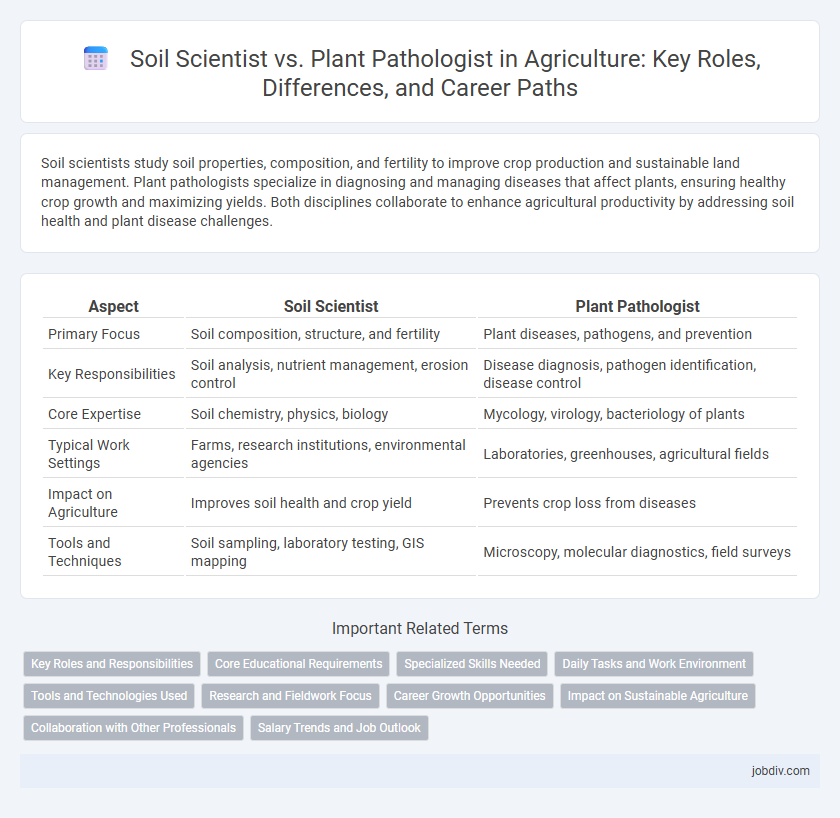Soil scientists study soil properties, composition, and fertility to improve crop production and sustainable land management. Plant pathologists specialize in diagnosing and managing diseases that affect plants, ensuring healthy crop growth and maximizing yields. Both disciplines collaborate to enhance agricultural productivity by addressing soil health and plant disease challenges.
Table of Comparison
| Aspect | Soil Scientist | Plant Pathologist |
|---|---|---|
| Primary Focus | Soil composition, structure, and fertility | Plant diseases, pathogens, and prevention |
| Key Responsibilities | Soil analysis, nutrient management, erosion control | Disease diagnosis, pathogen identification, disease control |
| Core Expertise | Soil chemistry, physics, biology | Mycology, virology, bacteriology of plants |
| Typical Work Settings | Farms, research institutions, environmental agencies | Laboratories, greenhouses, agricultural fields |
| Impact on Agriculture | Improves soil health and crop yield | Prevents crop loss from diseases |
| Tools and Techniques | Soil sampling, laboratory testing, GIS mapping | Microscopy, molecular diagnostics, field surveys |
Key Roles and Responsibilities
Soil scientists analyze soil composition, structure, and fertility to optimize land use and enhance crop production, focusing on soil health management, nutrient cycling, and erosion control. Plant pathologists diagnose and study plant diseases caused by pathogens such as fungi, bacteria, and viruses, developing disease management strategies to prevent crop losses and improve plant health. Both specialists collaborate to ensure sustainable agriculture by integrating soil management and plant disease control for increased yield and environmental protection.
Core Educational Requirements
Soil scientists require a strong foundation in soil chemistry, geology, and environmental science, typically holding a bachelor's degree in soil science, agronomy, or environmental science. Plant pathologists must study plant biology, microbiology, and disease management, usually earning a degree in plant pathology, biology, or agricultural science. Both fields emphasize laboratory research skills and analytical techniques to address agricultural challenges related to soil health and plant diseases.
Specialized Skills Needed
Soil scientists require expertise in soil chemistry, texture, and nutrient cycling to analyze and improve soil health for optimal crop production. Plant pathologists specialize in diagnosing plant diseases, understanding pathogen life cycles, and developing management strategies to protect crops from pests and infections. Both roles demand strong skills in field sampling, laboratory analysis, and data interpretation to enhance sustainable agricultural practices.
Daily Tasks and Work Environment
Soil scientists analyze soil properties, conduct field surveys, and collect samples to assess nutrient levels and recommend soil management strategies. Plant pathologists focus on diagnosing plant diseases, studying pathogens, and developing treatment plans to protect crops from infections. Both professionals work in laboratories and outdoor environments, but soil scientists spend more time on soil sampling and geospatial analysis, whereas plant pathologists frequently engage in microscopy and pathogen culturing.
Tools and Technologies Used
Soil scientists utilize tools such as soil augers, moisture sensors, and spectrometers to analyze soil composition, structure, and nutrient availability for optimal crop growth. Plant pathologists rely on technologies like DNA sequencing, microscopy, and pathogen detection kits to identify and study diseases affecting plants at the molecular and cellular levels. Both experts increasingly integrate Geographic Information Systems (GIS) and remote sensing for precise monitoring and management of soil health and plant disease outbreaks.
Research and Fieldwork Focus
Soil scientists primarily investigate soil properties, composition, and nutrient cycles to enhance soil health and agricultural productivity. Plant pathologists concentrate on identifying and managing plant diseases caused by pathogens, often conducting field surveys and laboratory experiments to develop disease-resistant crop varieties. Both roles involve extensive research, but soil scientists emphasize soil ecosystems, while plant pathologists focus on plant-microbe interactions affecting crop yield.
Career Growth Opportunities
Soil scientists explore soil composition, fertility, and management, crucial for sustainable agriculture and land conservation, with career growth often found in environmental consulting, government agencies, and agricultural research institutions. Plant pathologists study plant diseases caused by pathogens and pests, playing a vital role in crop protection and food security, with expanding opportunities in biotechnology companies, regulatory agencies, and academic research. Both careers demand specialized expertise but offer unique growth trajectories aligned with global agricultural challenges and innovations.
Impact on Sustainable Agriculture
Soil scientists enhance sustainable agriculture by analyzing soil properties and improving nutrient management to promote healthy crop growth and prevent land degradation. Plant pathologists contribute by diagnosing and controlling plant diseases, reducing crop losses and minimizing the reliance on chemical pesticides. Together, their expertise supports resilient agroecosystems and sustainable food production.
Collaboration with Other Professionals
Soil scientists collaborate closely with plant pathologists to ensure healthy crop growth by analyzing soil conditions and diagnosing disease-causing pathogens. Their combined expertise guides sustainable soil management practices and effective disease control strategies, enhancing agricultural productivity. Integration of soil chemistry data and pathogen identification enables precise interventions for crop protection and soil health maintenance.
Salary Trends and Job Outlook
Soil scientists typically earn average salaries between $55,000 and $95,000 annually, with job growth projected at 5% over the next decade due to increasing demand for sustainable land management. Plant pathologists command higher salaries, ranging from $60,000 to $110,000, driven by the critical need to manage crop diseases amid global food security challenges, with employment growth estimated at 6%. Both roles offer strong job stability, but plant pathologists may experience faster salary increases linked to advances in biotechnological research and agricultural innovation.
Soil Scientist vs Plant Pathologist Infographic

 jobdiv.com
jobdiv.com